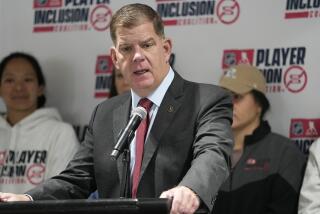NHL Puts Start of Season on Ice for Two Weeks : Hockey: Bettman postpones openers until at least Oct. 15 and urges players’ union to resume talks.
- Share via
Hoping to accomplish in two weeks what he and the players have been unable to thrash out in 16 months, NHL Commissioner Gary Bettman delayed today’s season openers until Oct. 15 and urged the union to immediately resume intensive contract talks. Should the dispute carry beyond that date, Bettman said Friday, games would be lost for the first time in league history.
If the deadline approaches with negotiators not in accord but involved in what he called “substantial good faith negotiations,” Bettman said he would consider accepting the no-strike, no-lockout pledge offered Thursday by the players’ association.
“This is a league with profound economic problems,” Bettman said at a news conference in New York. “Unless players are prepared to negotiate, simply agreeing to a no-strike pledge without a new agreement will only defer the inevitable and exacerbate the problem.”
The hockey players thus join major league baseball players on the outside, looking in. The baseball players went on strike in a similar dispute Aug. 12, and the rest of the season was canceled Sept. 14.
Bettman instructed clubs to make ice time available for players to work out, but many players packed their gear and dispersed after hearing his announcement. Bob Goodenow, executive director of the NHL Players Assn., said players will not continue formal practices, but added he will continue negotiations with Bettman sometime next week.
Goodenow was to meet today in Toronto with each team’s union representative to discuss plans for the next two weeks.
“Good faith seems to me to mean his terms for an agreement,” Goodenow said.
Besides the substantial differences in how they would remedy the disparity of wealth among the NHL’s 26 clubs, the two chief negotiators had different definitions of Bettman’s latest decision.
The commissioner insisted the delay does not constitute a lockout because, he said, he expects the season to be played in its entirety. He said the schedule would be picked up on Oct. 15 and postponed games would be sandwiched into what are now days off or made up at what would have been the end of the season.
Goodenow, however, said he had received lockout notices from the governments of several Canadian provinces and planned to investigate the legal ramifications of delaying games.
“It’s an owners’ lockout, pure and simple,” Goodenow said. “The season is not going on as scheduled, players are not being allowed to play and they’re not being paid. It’s a lockout. We are disappointed. We were ready to start on time, but the NHL won’t let the games go on as scheduled.
“The negotiations have a possibility of moving the process forward. There’s no sense of compromise from Mr. Bettman on the real issue. That remains to be seen as the process goes on.”
As originally scheduled, the season would have gone through April 12 and the playoffs would have ended by June 12. A delay of two weeks or more would push the league to its latest finishing dates in both cases.
Players were skeptical that a settlement could be reached by Bettman’s new deadline and feared their season might be wiped out, as was the baseball season.
“Two weeks is not going to do it,” the Kings’ Wayne Gretzky said. “Right now, there are huge differences, and I just don’t see hockey being played this year.”
Brendan Shanahan of the St. Louis Blues said that in asking players to continue to practice without being paid, Bettman was questioning the players’ intelligence.
“I don’t think anybody wants to fall out of shape,” Shanahan said. “But at the same time I think it’s ridiculous to suggest we’re going to have a month and a half, two-month, three-month or five-month training camp.”
Said Pittsburgh’s Kevin Stevens: “I’m not confident at all we can get something done by Oct. 15. That’s just a lie.”
Bettman was flanked by representatives of 20 teams at the news conference.
Several owners and club governors spoke of facing financial crises if players do not agree to a system that would control the salaries of entry-level players, eliminate salary arbitration and establish a form of revenue sharing to help subsidize small-market clubs.
Those issues, as well as the terms of free agency, form the core of this dispute. To help support clubs with limited sources of revenue, owners advocate a salary limit on each club and imposing a graduated levy on clubs that exceed the limit. The pooled proceeds would be redistributed to needy clubs.
The players’ proposal involves a 5.5% levy on the payrolls and gate receipts of the 16 highest revenue-producing clubs, the money to be shared by the 10 lowest-revenue clubs.
Marcel Aubut, president and governor of the Quebec Nordiques, warned that his club would fail without economic safeguards. Quebec is among the small-market clubs, as are Edmonton and Winnipeg.
“Right now, professional hockey may not be able to survive in Canada,” Aubut said. “We have been working very hard in Quebec to compete with our fellow teams in the NHL and give our loyal fans in Quebec the best possible team to root for. We have tried to make our team something for all of Quebec to be proud of, but I don’t know how much longer we can proceed.
“If a system is not in place to make it possible for a team in the city of Quebec to compete on the ice with its fellow teams in other cities, we do not have a future. We cannot succeed over a long time without a new collective bargaining agreement to correct the economic imbalance under which we have been operating.”
The few executives willing to acknowledge that their clubs are profitable joined Aubut in calling for an overhaul of the league’s economic system.
“The past four, five years I look at it like being run over by a Chevrolet and getting squashed a little,” said Harry Sinden, the president and general manager of the Boston Bruins. “I’m worried that over the next four years, I’m going to be run over by a Mack truck and be squeezed flat.”
Said Cliff Fletcher, president and general manager of the Toronto Maple Leafs: “As a 26-team entity, we have very critical issues that have to be addressed, and to be in this situation a year from now makes absolutely no sense. We support the position that before we drop the puck to play hockey this year, there has to be a new collective bargaining agreement in place. Hopefully, that’ll be the 15th of October.”
Bypassing the union, Bettman appealed directly to players for their support in a letter distributed Friday.
“The inability thus far to make a deal is a shared responsibility,” he wrote. “It is not solely the fault of the NHL or the NHLPA. It is something I believe both sides sought to avoid. I have decided to write this letter because I think you are entitled to know what the league is seeking in a new agreement and why.
“We’ve given specific and detailed financial information to your union. Despite the growth of the NHL’s revenues, the league has lost money in the past couple of years. We need a player-employment system that avoids making this a league of haves and have-nots. Unless we develop that type of system, our recent success will not solve our competitive and economic problems. This situation must be addressed and addressed now.”
Bettman said the NHL, in the last four years, “has gone from a collective profit to a substantial collective loss,” but he would not state the extent of the losses or say how many clubs had lost money. He also said salaries had tripled in that span and that for every dollar clubs received in revenue, clubs had paid $1.14 in salaries.
Goodenow disputed Bettman’s contention that the league had disclosed all relevant financial information. Nor was Goodenow softened by the owners’ pleas of imminent poverty, saying a good accountant can legally juggle figures to make profits appear to be losses.
“It’s like an art form,” he said.
As signs of the NHL’s vitality, he cited the entrance into the league last year of the Walt Disney Co.’s Mighty Ducks and the Florida Panthers--owned by Blockbuster Video mogul Wayne Huizenga. He also pointed to the five-year, $155-million contract signed last month with the Fox TV network.
“All the objective information says the NHL is extremely healthy and prosperous,” he said. “We don’t have all the information on their profits. Originally, when the league and the players’ association talked about financial data, we were offered (the data) on the proviso we had to negotiate along the terms of a salary cap. We refused. Later on in the process we received some selected data, but not profits.”
Tony Tavares, president of the Ducks, said he knew a majority of teams had lost money and said Goodenow had overestimated the effect of the Fox deal, not calculating that it is equally divided among the 26 clubs. Profits from the sales of NHL-licensed merchandise are also split.
“When you add up the total profits and total losses, significant losses were experienced league-wide, and if you look at a trend, what’s happening league-wide is a deteriorating trend,” Tavares said. “Even though the pie is expanding, it’s not expanding as rapidly as in other sports.”
ESPN2, which was to have begun its NHL coverage tonight, will instead show minor league games. ESPN will substitute a variety of events, including motor sports and Canadian Football League games, beginning Tuesday. Fox is not scheduled to televise a game until Jan. 21.
The Kings were among the clubs not represented at the NHL news conference. A league spokesman said their absence, as well as that of executives of other clubs, was caused by scheduling conflicts and was not a sign of dissent.
More to Read
Go beyond the scoreboard
Get the latest on L.A.'s teams in the daily Sports Report newsletter.
You may occasionally receive promotional content from the Los Angeles Times.







